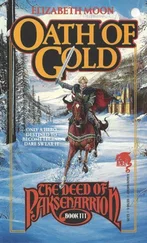Well, there was nothing I could do about it now. I brushed the snow from my pants and started walking across the Marktplatz. The shop she had mentioned was just off the central square, a couple of doors up one of the narrow streets. It wasn’t an antique shop, as I had supposed. The sign read “Müller—Holzschnitzerei,” and the small display window contained toys and ornaments carved out of wood, of the type sometimes referred to as “folk art.”
Bells chimed softly as I opened the door. There was no one in the shop. From an open door at the back came the sound of tapping and a smell that made my nostrils quiver appreciatively. Fresh wood shavings, hot glue, and pipe tobacco blended into an aroma as seductive as the finest perfume. My grandfather’s workshop smelled like that; I had spent many happy hours there as a child, hammering nails into wood scraps and making doll wigs out of curled shavings.
The tapping stopped. A man appeared in the open doorway, squinting at me through thick glasses.
He was short and square, with big gnarled hands. His shoulders filled the doorway from side to side. A light behind him made his hair shine like a silver nimbus.
After I had explained who I was and what I wanted, he put his pipe in his mouth and smoked in meditative silence for several seconds, without taking his eyes off me. Then he nodded and gestured. “ Herein, Fräulein .”
I followed him into the workshop. It was wonderful; tools were scattered over a long wooden table and sawdust had drifted like dun snow. He pointed, and then I saw it: a painted door, leaning disconsolately against the wall, splinters of wood hanging from the broken hinges.
“Oh, no,” I exclaimed. “What happened to it?”
My unconcealed distress pleased the old man. His formal manner relaxed, and he said, “That is how it was when I found it, the pieces piled in the courtyard ready to be burned. She was good enough to sell it to me.”
I damned Friedl with a few well-chosen words—in English, since I knew a man of his age and background would think poorly of a lady who used vulgar language. He got the idea from my tone, if not from the actual words, and his eyes were twinkling when I looked at him.
“Just so,” he said. “Don’t distress yourself, Fräulein. I can repair it. That is my trade, at which I excel. I have no real talent for creating, you understand, but for restoration, there is no one better. Do you still want to buy it?”
“Yes. Please.”
I didn’t even ask the price. At that point, I’d have been willing to hock my car and mortgage my house; this was a rescue operation, not a commercial transaction. How could Friedl have done such a stupid thing? She must have hated him, to destroy an object that would have brought a fancy price from any antique dealer.
“What happened to the other furniture?” I asked.
The old man shrugged. “It went, I believe, to a dealer in Garmisch. I could not afford to pay so much as he. One moment, Fräulein, I must finish this piece before the glue hardens.”
He settled himself on a stool, put his pipe carefully in an ashtray, and picked up the piece he had been working on—a carved head with a grotesque yet humorous grin—surely a caricature of a living model. The nose had been broken off; I stood watching as the old man carefully glued the nose, or a reproduction of it, into place.
“So,” he said. Swiveling slowly on the stool, he faced me, his hands resting heavily on his knees. His face was as rigid as the wooden one he had just repaired, hardened by harsh weather and long years. His hair clung to his skull like a white fur wig. Then his leathery cheeks cracked into deep lines and his thin lips curled up at the corners.
“So,” he repeated, “you are the so-learned Mädchen from the museum. Did you get the letter, then?”
“You sent it?” I gaped at him. “But how—why?”
His smile stiffened into sobriety, though a spark of amusement remained in the depths of his eyes. “I mailed it, I did not send it. There is a difference.”
“You are right. There is a difference. I…Can I sit down?”
“Please.”
He picked up an oily rag and passed it carefully over a backless chair inches deep in sawdust.
“Thank you,” I said meekly. “Would you mind telling me how it happened?”
“It does not take long to tell. I was working late in the shop, as I often do. I heard the sounds from the Marktplatz. They were the sounds of death,” the old man said simply. “The car did not stop; it accelerated and went on. I had expected him, you see. He had said he would come that evening. I went as quickly as I could, but there were others there before me; they made a circle around him. I saw only one shoe. I knew it, and pushed through them. His blood soaked the snow and spread as I bent over him. He knew me. He had no breath to speak, but he moved his hand—pushed the letter toward me. I knew what he wanted. We had been friends a long time.”
He picked up his pipe and slowly tapped out the dead embers.
“I’m glad,” I said. It was a stupid thing to say, but he understood.
“Glad there is someone to mourn him? Yes. The only one. She…” He turned his head aside and spat neatly into the pile of shavings beside him. Then he went on in the same calm voice, “It happens to old men, even those who should know better. After Amelie died, he was verrückt —crazy with grief. A man needs a woman, and she knew how to use her advantage.”
“I’m sure she did. But…Do you know what was in the letter?”
“I do not open mail addressed to other people. It was so important to him that he thought of it with his last breath; that was enough for me. But I knew your name. He had spoken of you.”
“What did he say?”
His eyes glinted. “That if he were forty years younger he would go to Munich to see you—and perhaps to do other things.”
For some absurd reason I felt tears coming to my eyes. I gave him a watery smile. “If he had been forty years younger, I probably would have done them. He was a good man.”
“Yes, a learned man. Not like me; I am only an ignorant worker, with no more than Volksschule . But he liked to talk to me.”
“He never said anything to you about…” I didn’t hesitate because I didn’t trust him. I hesitated because I didn’t want his blood reddening the snow in the Marktplatz. “About why he might want to get in touch with me?”
“No, nothing. When he spoke of you, it was in connection with art.” The old man’s face was stiff with pride. “Yes, we talked of such things, the scholar and the ignorant peasant. He loved beautiful things, and no craftsman worthy of the name can be indifferent to a fine work of art.” His fingers caressed the surface of the sculptured head. “This would have hurt him. Often he spoke of the destruction of beauty—the statues broken, the paintings slashed by barbarians. So much lost. So much that can never be retrieved.”
His voice was as deep as a dirge; it reminded me of the passage in the Brahms Requiem when the soft voices mourn in grieving resignation. “Behold, all flesh is as the grass, and all the goodliness of man is as the flowers of the field; for lo, the grass with-ereth….”
I knew I was going to break down and blubber if I didn’t get away. “I must go,” I said, rising. “I’m afraid I am interrupting your lunch.”
“No, I have this with me.” He reached for a paper-wrapped sandwich. “Will you share? It is good ham and cheese.”
I refused with thanks; but a rustling noise heralded the appearance of someone who was definitely interested in the offer. As the sleek fawn body slid out from under a bench I exclaimed, “Surely, that is Herr Hoffman’s cat.”
Читать дальше








